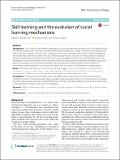Files in this item
Skill learning and the evolution of social learning mechanisms
Item metadata
| dc.contributor.author | van der Post, Daniel J. | |
| dc.contributor.author | Franz, Mathias | |
| dc.contributor.author | Laland, Kevin Neville | |
| dc.date.accessioned | 2016-08-29T15:30:10Z | |
| dc.date.available | 2016-08-29T15:30:10Z | |
| dc.date.issued | 2016-08-24 | |
| dc.identifier | 245081040 | |
| dc.identifier | 4792176b-9938-4e7f-9af0-d5762d073d47 | |
| dc.identifier | 84983377986 | |
| dc.identifier | 000381814600001 | |
| dc.identifier.citation | van der Post , D J , Franz , M & Laland , K N 2016 , ' Skill learning and the evolution of social learning mechanisms ' , BMC Evolutionary Biology , vol. 16 , 166 . https://doi.org/10.1186/s12862-016-0742-9 | en |
| dc.identifier.issn | 1471-2148 | |
| dc.identifier.other | ORCID: /0000-0002-2457-0900/work/60630426 | |
| dc.identifier.uri | https://hdl.handle.net/10023/9395 | |
| dc.description | This research was supported by a grant from The John Templeton Foundation. | en |
| dc.description.abstract | Background. Social learning is potentially advantageous, but evolutionary theory predicts that (i) its benefits may be self-limiting because social learning can lead to information parasitism, and (ii) these limitations can be mitigated via forms of selective copying. However, these findings arise from a functional approach in which learning mechanisms are not specified, and which assumes that social learning avoids the costs of asocial learning but does not produce information about the environment. Whether these findings generalize to all kinds of social learning remains to be established. Using a detailed multi-scale evolutionary model, we investigate the payoffs and information production processes of specific social learning mechanisms (including local enhancement, stimulus enhancement and observational learning) and their evolutionary consequences in the context of skill learning in foraging groups. Results. We find that local enhancement does not benefit foraging success, but could evolve as a side-effect of grouping. In contrast, stimulus enhancement and observational learning can be beneficial across a wide range of environmental conditions because they generate opportunities for new learning outcomes. Conclusions. In contrast to much existing theory, we find that the functional outcomes of social learning are mechanism specific. Social learning nearly always produces information about the environment, and does not always avoid the costs of asocial learning or support information parasitism. Our study supports work emphasizing the value of incorporating mechanistic detail in functional analyses. | |
| dc.format.extent | 19 | |
| dc.format.extent | 2254087 | |
| dc.language.iso | eng | |
| dc.relation.ispartof | BMC Evolutionary Biology | en |
| dc.subject | Multi-scale approach | en |
| dc.subject | Agent-based model | en |
| dc.subject | Information parasitism | en |
| dc.subject | Mechanism specificity | en |
| dc.subject | Group foragers | en |
| dc.subject | Self-organization | en |
| dc.subject | QH301 Biology | en |
| dc.subject.lcc | QH301 | en |
| dc.title | Skill learning and the evolution of social learning mechanisms | en |
| dc.type | Journal article | en |
| dc.contributor.institution | University of St Andrews. School of Biology | en |
| dc.contributor.institution | University of St Andrews. Scottish Oceans Institute | en |
| dc.contributor.institution | University of St Andrews. Institute of Behavioural and Neural Sciences | en |
| dc.contributor.institution | University of St Andrews. Centre for Social Learning & Cognitive Evolution | en |
| dc.contributor.institution | University of St Andrews. Centre for Biological Diversity | en |
| dc.identifier.doi | https://doi.org/10.1186/s12862-016-0742-9 | |
| dc.description.status | Peer reviewed | en |
This item appears in the following Collection(s)
Items in the St Andrews Research Repository are protected by copyright, with all rights reserved, unless otherwise indicated.

